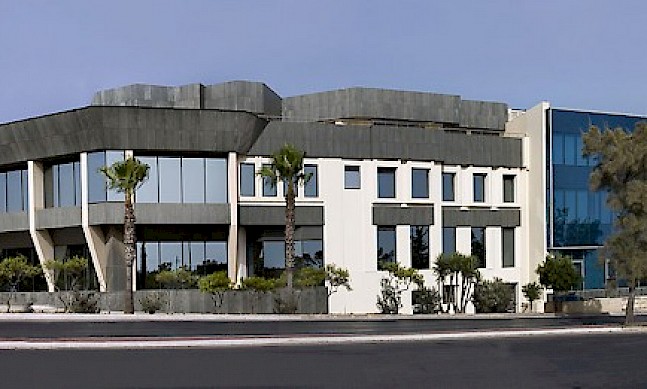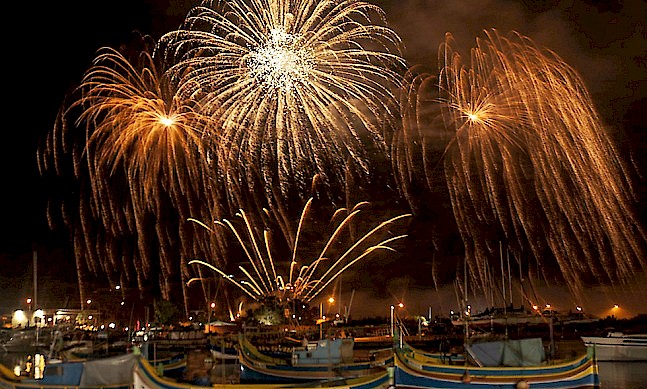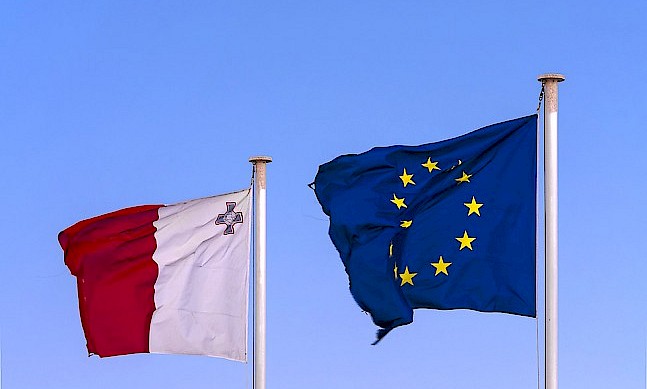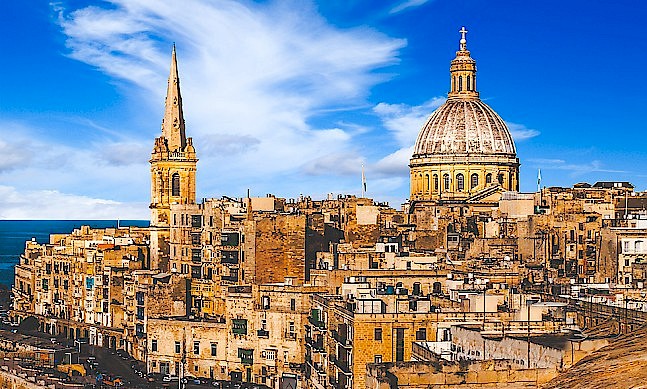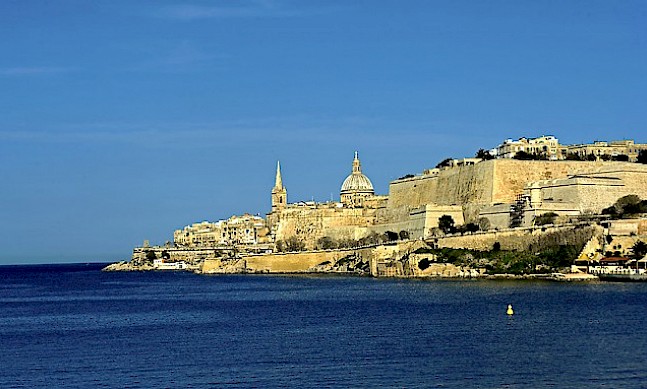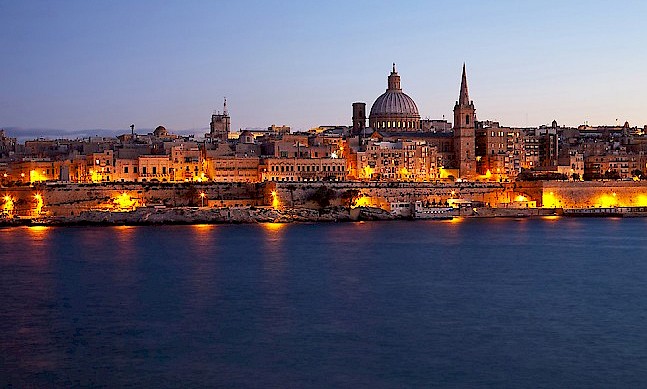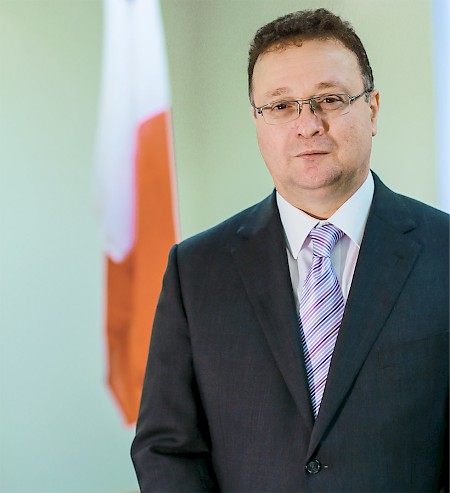
As an island nation with a growing influx of tourists and growing demands from industry, Malta faces huge pressures on its water supply. With technological innovations and efficiency gains, Water Services Corporation, the country’s water utility, is working hard to combat this challenge, and is now exporting its knowhow to other nations in the region facing the same issues. The Report Company met with William Wait, the corporation’s executive chairman, to find out more.
The Report Company: What challenges have you faced since taking up this role in late 2013?
William Wait: When I joined Water Services, there were a few challenges which were presenting themselves to us. I made a decision very early on that unless I aligned the people within the organisation to what we really wanted to do, it was going to be a big challenge to achieve what we had in mind.
In my first few months, I focused a lot on ensuring that the structure, in terms of people, was correct. We had a few vacancies at managerial level, at the professional level, and also at the operational level, which we needed to fill. Being a public corporation, the process of filling vacancies is much longer than in the private sector, because there is a procedure to follow, so it took some time to do that.
Then, I started looking at some detail in the way we operated in Malta. The employees are collectively represented by their union, and there is an agreement which covers the conditions of employment of those employees. We have approximately 1,000 people here, so quite a large number. We are one of the largest employers in Malta. When I arrived, I discovered that the collective agreement with the workers’ union was outdated by three and a half years. To be honest, I don’t know how there was never any unrest, but there wasn’t. So I focused very hard, and in three months we organised the collective agreement, and then backdated it for three years, and all of us could then see that the organisation was breathing again because people started realising that somebody was here who was going to take care of them. In the meantime, we negotiated another agreement to cover the next four years. That means that the people who work at this organisation know exactly what they will have in terms of benefits and framework.
This is extremely important, because whilst with the proper financing in place anyone can buy machines, bowsers, and reverse osmosis plants, what makes the organisation work is its people.
The defining characteristic of my chairmanship of this organisation is its focus on people, and I do this because I like people, and also because I come from a working-class environment, so I know the importance of a few euros in the salaries of the workers. This also gives me the ability to go and ask people to work harder, and they will do it, because they know that I have been focusing on improving their conditions of employment. Once we did all of this, all of a sudden the organisation became freer, it became lighter, and then we could start getting down to business.
“Whilst with the proper financing in place anyone can buy machines, bowsers, and reverse osmosis plants, what makes the organisation work is its people.”Tweet This
The second focus was looking at the infrastructure that we had. Unfortunately, the infrastructure had been neglected because of a lack of funds, as during the financial crisis we had had to work hard to remain within the budgetary constraints of the European Union. But today, with the economy improving, we have a little bit more breathing space, so we put in plans to improve our infrastructure.
We started looking at our reverse osmosis plants, we started looking at our sewage treatment plants, and we started looking again at projects which had been shelved for many years. We started giving them life again.
Another focus has been on water quality. The water quality in Malta is very good. The taste, however, is not. That is where we are working with companies from outside Malta, including Israel for example, to try and improve the taste of the water to encourage more people to drink tap water.
We also focus on utilising a lot of EU funding. From the previous EU funding period which ends in December 2015, we are utilising approximately €40 million in projects which we need to finish now. This includes the network infrastructure, the water distribution system, and also improvements in the processes themselves.
TRC: Which projects have you carried out so far?
WW: A few major projects that we did were in the distribution of water, because the system was ageing, and an ageing system makes distribution inefficient, and therefore you need to pump more, which consumes more electricity, which means more costs and more environmental impact and carbon footprint. We changed major water pipelines, not only in Malta but also in Gozo. In fact, in Gozo, we did the largest water infrastructure project that the island has seen in the last 50 years, changing the main pipeline, which is 10 km long.
Another important project is producing what we are calling new water. In Malta we treat 100% of our wastewater, our sewage and our drainage. We have three sewage treatment plants, one is in the south of our country, one is in Gozo and one is in the north. Today, we receive all of the wastewater, we treat it, and we get sludge and clean water. We throw the clean water into the sea, and with the sludge, part of it is used to generate electricity, and the rest we throw away in a landfill.
“Investment in technology is key. Every year, a lot of our focus is on producing more efficiently.”Tweet This
What we are doing now is building additional filtration plants in the three sewage plants, so the water produced will be passed to industry. Although this water is treated to potable standards, we’re not going to feed it into the potable water system; it will go to agriculture and so on. This project should be in operation by 2016. We are also building the infrastructure for the delivery of this water. We are doing something which is new for Malta, which is micro tunnelling. Normally, we cut the roads open to access our infrastructure, but by using this new technology from Italy, we will just have to dig a few small holes.
TRC: The WSC is looked upon as a best practice example of leakage control by other water companies. How did this happen?
WW: Water leakage in 1995 was over 4000m³ an hour. Water leakage in 2014 was less than 400m³ an hour. In 1995, we put in a water leakage management plan, using IT to measure exactly what was being produced, to help us understand where we were losing our water. We invested in equipment to do this.
Before our leakage management program, we had five reverse osmosis plants running at 100 percent capacity, and we did not have water all the time. Now we have just three plants running at 60 percent capacity, and we have a reliable water supply.
Following our success in this, the World Bank came down to Malta and did a study on us, and then they brought down a conference with about 50 people, from Libya, Morocco, Tunisia, Europe and the United States. The World Bank did a final report on us, and identified three major areas where we could assist them with their projects in the Middle East and North Africa. These areas were water leakage, reverse osmosis desalination, and the use of geographic information systems. We ended up doing our first project in Beirut, and we have built a very strong rapport with them there, and they now would like to send their people to Malta for training.
One thing which is very important is that in 1967, Malta was a beneficiary of the World Bank, and got a loan of $7.5 million from the World Bank to do desalination. Before that, we only had the groundwater aquifer. Malta has used that money, paid it back, and now Malta is giving back to the World Bank and to other countries by sharing its expertise.
“From Malta’s leadership downwards, we have a message that we want to be positive, and we want to be optimists.”Tweet This
TRC: What is the WSC’s approach to internationalisation?
WW: The Beirut project is our first foray into internationalisation. We need to prove ourselves, and then take things from there. It’s nice to dream big, but something like taking over water utilities outside Malta is a little bit too much for now, but that does not mean that we are not open to partnerships, or joint ventures, with other companies out there who lack certain expertise.
TRC: How important is innovation and investment in technology?
WW: Investment in technology is key. Every year, a lot of our focus is on producing more efficiently. One of our largest costs is energy, so we have plans to utilise waste more, because waste can generate energy, and we have big spaces where we can utilise photovoltaics. By doing this, we will not only reduce our own energy consumption by using alternative energy, but we will also indirectly be benefiting the country, because the country has targets to reach of alternative energy production.
TRC: How are you ensuring that you have the right human resources to continue developing as a corporation?
WW: It’s about building our reputation out there among the public that WSC is a corporation that one would aspire to work in. You do that by ensuring that the people within the corporation today have the best possible working conditions and the best possible working environment. That is why, very early on, I focused on that. I want WSC to be in a position where if someone goes and interviews the MCAST students or the university students or any other student on where they would like to work, they would say that they would want to work with us. I want our people to talk with passion about their work. I want them to say with pride that we are exporting our expertise, and dealing with other companies. We are not just another company; this is the Water Services Corporation, this is the lifeblood of the country. Without water, you die.
TRC: What are you doing to raise awareness of WSC’s role in Malta?
WW: I am not a hundred percent pleased about the way that we communicate about ourselves. The biggest communication tool for the Water Services Corporation is its 1,000 employees. If I can get those employees to be motivated and speak about the corporation in the same way as I do and my team does, then we will have 1,000 people out there who are advocates for the corporation. Yes, we are going to sometimes fall, we’re going to make mistakes, but the majority of those messages are going to be positive. This is also the same message that is reflected across the country today. From Malta’s leadership downwards, we have a message that we want to be positive, and we want to be optimists.




